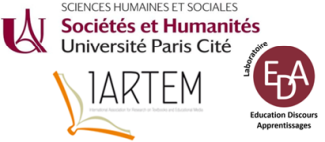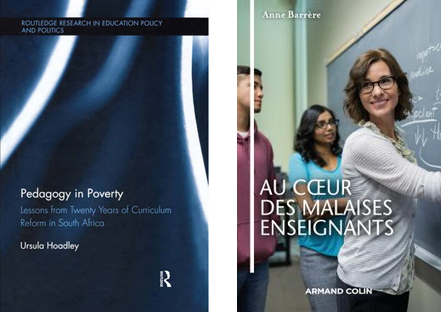|
|
|
Detailed program > Round Table 1Textbooks and educational resources as objects and as instruments for teaching and learning. What to expect from research?Moderators : A. Smart & G-L Baron Should policy makers rely on evidence to identify good practices that might to lead to desirable changes in the educational system? This idea has been popular for at least the past quarter century. A recent report by the Global Education Evidence Advisory Panel (GEEAP) (GEEAP), addressed to governments of low and medium income countries, singles out “great buys” (and “bad” buys”), judging interventions on the basis of evidence established by research. They offer a series of evaluations on educational interventions, judging from an estimation of “cost effectiveness”. The word research appears 71 times in this 35-page document. The text explains that what was considered is “a range of rigorous evaluative research on education and learning, primarily in LICs [low income countries] and MICs [middle income countries]”, the choice of cases having been based on the fact that their methodology was able to “distinguish the causal effect of an intervention”. Not much else is said about those researches but the curious reader can go the bibliography. It should also be mentioned that the text insists on the point that the issue is systemic. Thus, some questions arise. For example, regarding advice based mostly on research about out of school programs that are rated as promising but limited evidence, one finds the following: “Using software that allows personalized learning and adapts to the learning level of the child (where hardware is already in schools”)”. Textbooks appear in a discreet way, mainly to indicate that it would be a bad buy to provide “additional inputs alone, when other issues are not addressed, including: textbooks, additional teachers to reduce class size, school buildings, grants, salary, libraries (this is a well known classical result) … An implicit assumption of the document is that giving examples of good practice will convince those in charge of designing and funding educational interventions. This assumption is not supported by much evidence itself. For example Nelson (2021), researching the effect of the What Works Consortium (WWC) launched by the Georges W Bush administration at the beginning of the 2000s, remarked that the evidence he collected suggests that “the WWC is struggling to reach its intended users, and for those whom it does reach, its outputs are likely perceived as irrelevant. The evidence further suggests that some educators—especially those concerned about the generalizability of research findings—may find the WWC’s information to be untrustworthy.” A similar finding has recently been published by Riordan (2023). Relying on a large British empirical study on the efficiency of policies aiming at improving the educational outcomes of students facing socio-economic disadvantages, she argues that “the determination to base school practice on research and the political motivation to improve social mobility—are failing to deliver their intended consequences”. Thus, the issue of how best to disseminate research (not only the results but also the construction of research questions) persists, but is still open. Probably, as Baron & Fluckiger (2021) suggested, relying on a wide corpus of research led in France, what is in order is the “long-term development of multidisciplinary and multi-cultural forums for exchange […] in order to consolidate networks of diverse communities with an interest in exchanging in order to form sustainable hybrid collectives”. Regarding textbooks and educational media, research is at the heart of IARTEM’s activity, but with a huge diversity. Traditional textbooks raise questions that are not same as those for online resources, which may be designed and disseminated outside of the main stream. Most of the research so far presented at IARTEM conferences does not aim at predicting results, but tries to document, analyse, and understand what is developing. Researchers may concentrate on the resource itself, its structure and its content, or they may investigate its actual uses in classrooms or its impact on learning. They may aim to describe, evaluate, predict, or explain. The spectrum is wide and may be perceived in different ways by non-researchers. Furthermore, current research traditions, conceptual frameworks and actual methods cover a wide spectrum. Diversity matters to IARTEM, whether in terms of aims, methods or fields and. The questions the round table will discuss are: What is the current situation regarding research into educational media and how is it evolving? What trends may be identified? What are society’s expectations from research? And what do we know of the impact of research on policy? ReferencesBaron, G.-L. et Fluckiger, C. (2021). Approches et paradigmes pour la recherche sur les usages éducatifs des technologies: Enjeux et perspectives. Canadian Journal of Learning and Technology, 47(4). https://doi.org/10.21432/cjlt28059 GEEAP - Global Education Evidence Advisory Panel (2023). Cost-Effective Approaches to Improve Global Learning - What does recent evidence tell us are “Smart Buys” for improving learning in low- and middle-income countries? London, Washington D.C., New York. FCDO, the World Bank, UNICEF, and USAID. https://thedocs.worldbank.org/en/doc/231d98251cf326922518be0cbe306fdc-0200022023/related/GEEAP-Report-Smart-Buys-2023-final.pdf Nelson, A. A. (2021). Is What Works Working? Thinking Evaluatively About the What Works Clearinghouse. https://uknowledge.uky.edu/edsc_etds/81/ Riordan, S. (2022). Improving teaching quality to compensate for socio-economic disadvantages: A study of research dissemination across secondary schools in England. Review of Education, 10(2), e3354. https://doi.org/10.1002/rev3.3354
About the participantsAndy Smart. Vice president of IARTEM, he is an education and publishing consultant with a background in teaching and educational and children’s publishing. He specialises in textbook policy, planning and development.Co-convener Nissem.org Nathalie Pujo, Deputy Director of Hachette Education (see Hachette Livre). She has been appointed Deputy Managing Director for Europe of the Infogrames group. In 2002, she joined the Hachette Livre group as General Secretary of the Education division. Since 2006, she has been Director of Hachette Tourisme and Managing Director of Cyberterre, which operates the Routard.com website. Nathalie Pujo was a member of the Conseil National du Numérique from 2013 to 2016. Ursula Hoadley, Professor in Curriculum in the School of Education at the University of Cape Town. Her research focuses on the relationship between forms of curriculum, pedagogy and school organisation and social inequalities. She is the author of Pedagogy in Poverty: 20 years of curriculum reform in South Africa published by Routledge. Her most recent work has focused on structured early grade reading programmes in Liberia, Uganda and South Africa and curriculum policy-making during COVID-19. Anne Barrère, Professor of education, Université Paris Cité. Sociology of work in schools (school work, teaching work, work of school heads); Sociology of schools (regulations, analysis of systems); School culture and youth cultures; Artistic and cultural education. Latest book, "Au cœur des malaises enseignants" (At the heart of teacher discontent). Current research :School in the age of tutorials (L’école au temps des tutoriels) Georges-Louis Baron is professor emeritus of education at Université Paris Cité. His research interests are about educational uses of information technology by the different actors of education (especially teachers). Several fields of reference inspire him: the sociology of education and the sociology of organizations, but also the work of cognitive scientists and pedagogues. He is currently editor in chief or the IARTEM e-journal.
|



